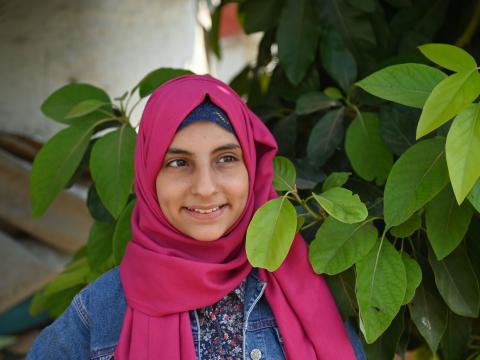An educational transition

Learning is a process that allows its seeker to acquire new knowledge and understanding.
Unfortunately, due to the COVID-19 outbreak, access to child development and quality learning opportunities have declined.
In partnership with UNICEF, World Vision Lebanon implemented the Non-Formal Education (NFE) project under the COVER response. The project was modified so that it could be conducted remotely with the caregivers. The children, ages 10-14, who are registered in Basic Literacy and Numeracy (BLN) classes, receive activity sheets and psycho-social support (PSS) kits. Parents of the children receive COVID-19 messages and Information Education and Communication (IEC) materials weekly, along with daily tips from the teachers to help them engage in their children's learning process.
Malak, is a 12-year-old Syrian refugee living in Aarka, North of Lebanon. When she first started going to World Vision's learning centre, Malak went through some challenges due to her shy personality. Now a sixth-grader, she has been attending a learning centre supported by World Vision for two years, and could not be happier. "I cannot wait to get back and see my teachers and play with my friends," she says, "my first days there, I was shy and sat with my sister and cousin all the time, but after a while, I started making friends, and I was more confident even in class." Because of COVID-19, she had to experience the transition of the educational system from going to the centre with her friends to remote learning at home.
According to Marwa, Malak's teacher, the little girl always showed a positive attitude towards education, even when they switched to remote learning. "It is such a motivation for me as a teacher to see the positive impact we can have on our students, especially Malak who at first was shy and did not participate and now she has started to be very outspoken."
Reading and writing were always Malak’s goals ever since she saw her sister go to school back in Syria, and now through the remote learning, she will be able to proceed with it.
"Through the online sessions, our teachers are helping us learn English, Arabic and math," explains Malak, "and one day, I want to become a teacher so I can be able to do the same and help other girls."
Staff were receiving pictures and messages from the caregivers expressing their gratitude and happiness to be working on the learning sheets with their children. Projects like Basic Literacy and Numeracy, allow girls like Malak to keep dreaming and ensures that the education of the most vulnerable children is a priority, no matter what circumstances the world is facing.